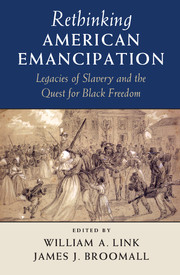Book contents
- Frontmatter
- Contents
- List of figures
- Notes on the Editors and Contributors
- Acknowledgments
- Introduction
- I CLAIMING EMANCIPATION
- II CONTESTING EMANCIPATION
- III REMEMBERING EMANCIPATION
- 7 African Americans and the Long Emancipation in New South Atlanta
- 8 Washington, Toussaint, and Bolivar, “The Glorious Advocates of Liberty”: Black Internationalism and Reimagining Emancipation
- 9 Remembering the Abolitionists and the Meanings of Freedom
- Epilogue: Emancipation and the Nation
- Index
8 - Washington, Toussaint, and Bolivar, “The Glorious Advocates of Liberty”: Black Internationalism and Reimagining Emancipation
from III - REMEMBERING EMANCIPATION
Published online by Cambridge University Press: 05 November 2015
- Frontmatter
- Contents
- List of figures
- Notes on the Editors and Contributors
- Acknowledgments
- Introduction
- I CLAIMING EMANCIPATION
- II CONTESTING EMANCIPATION
- III REMEMBERING EMANCIPATION
- 7 African Americans and the Long Emancipation in New South Atlanta
- 8 Washington, Toussaint, and Bolivar, “The Glorious Advocates of Liberty”: Black Internationalism and Reimagining Emancipation
- 9 Remembering the Abolitionists and the Meanings of Freedom
- Epilogue: Emancipation and the Nation
- Index
Summary
For African Americans, the struggle against slavery did not begin and end in the United States; it was conceived of as a global conflict. From this perspective, the Haitian Revolution represented a great breakthrough in the Americas. Led by a former house slave by the name of Toussaint L'Ouverture, regiments of ex-slaves defeated colonial armies from England, Spain, and France who sought to re-impose chattel bondage on the former French colony. This was an epic story that people of the African Diaspora treasured deeply in their hearts. As African Americans understood – and as historians have reconfirmed – the Haitian Revolution was a major impetus for slavery abolition in the Americas. African Americans throughout the United States commemorated the Haitian Revolution in many ways. Black newspapers regularly featured stories on the anti-slavery struggle in Haiti, and parents taught their children about the brave General L'Ouverture. Black communities named streets and neighborhoods after revolutionary heroes. Students at the Institute for Colored Youth in Philadelphia were required to learn and to recite General Jean-Jacques Dessalines's “1804 Independence Address to the Haytians.” Freedom's Journal argued in 1827 that
there are very few events on record which have produced more extraordinary men than the revolution in St. Domingo. The negro character at that eventful period, burst upon us in all the splendor of native and original greatness; and the subsequent transactions in that Island have presented the most incontestable truths that the negro is not, in general, wanting in the higher qualifications of the mind.
Free African Americans in Baltimore gathered to celebrate the twenty-first anniversary of Haitian Independence in a public commemoration in August 1825. In the fashion of early nineteenth-century commemorations, those assembled raised their glasses to offer a series of toasts in honor of the auspicious occasion. The culminating toast was: “Washington, Toussaint, and Bolivar – Unequalled in fame – the friends of mankind – the glorious advocates of Liberty.” In this gesture, African Americans connected the fate of their own freedom with the emancipation of their brothers and sisters in Latin America and the Caribbean. The toast promoted an understanding of the intimate connections between movements for liberty throughout the Americas.
- Type
- Chapter
- Information
- Rethinking American EmancipationLegacies of Slavery and the Quest for Black Freedom, pp. 187 - 215Publisher: Cambridge University PressPrint publication year: 2015

